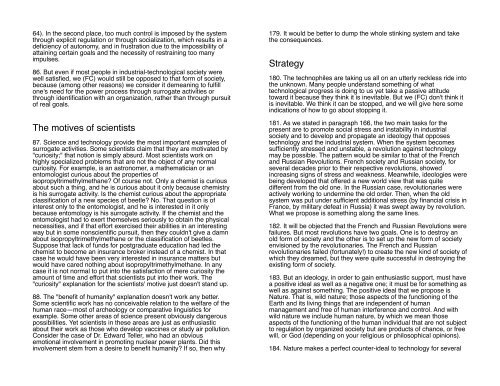Unabomber Manifesto - ouroboros ponderosa
Unabomber Manifesto - ouroboros ponderosa
Unabomber Manifesto - ouroboros ponderosa
Create successful ePaper yourself
Turn your PDF publications into a flip-book with our unique Google optimized e-Paper software.
64). In the second place, too much control is imposed by the systemthrough explicit regulation or through socialization, which results in adeficiency of autonomy, and in frustration due to the impossibility ofattaining certain goals and the necessity of restraining too manyimpulses.86. But even if most people in industrial-technological society werewell satisfied, we (FC) would still be opposed to that form of society,because (among other reasons) we consider it demeaning to fulfillone's need for the power process through surrogate activities orthrough identification with an organization, rather than through pursuitof real goals.The motives of scientists87. Science and technology provide the most important examples ofsurrogate activities. Some scientists claim that they are motivated by"curiosity;" that notion is simply absurd. Most scientists work onhighly specialized problems that are not the object of any normalcuriosity. For example, is an astronomer, a mathematician or anentomologist curious about the properties ofisopropyltrimethylmethane? Of course not. Only a chemist is curiousabout such a thing, and he is curious about it only because chemistryis his surrogate activity. Is the chemist curious about the appropriateclassification of a new species of beetle? No. That question is ofinterest only to the entomologist, and he is interested in it onlybecause entomology is his surrogate activity. If the chemist and theentomologist had to exert themselves seriously to obtain the physicalnecessities, and if that effort exercised their abilities in an interestingway but in some nonscientific pursuit, then they couldn't give a damnabout isopropyltrimethylmethane or the classification of beetles.Suppose that lack of funds for postgraduate education had led thechemist to become an insurance broker instead of a chemist. In thatcase he would have been very interested in insurance matters butwould have cared nothing about isopropyltrimethylmethane. In anycase it is not normal to put into the satisfaction of mere curiosity theamount of time and effort that scientists put into their work. The"curiosity" explanation for the scientists' motive just doesn't stand up.88. The "benefit of humanity" explanation doesn't work any better.Some scientific work has no conceivable relation to the welfare of thehuman race—most of archeology or comparative linguistics forexample. Some other areas of science present obviously dangerouspossibilities. Yet scientists in these areas are just as enthusiasticabout their work as those who develop vaccines or study air pollution.Consider the case of Dr. Edward Teller, who had an obviousemotional involvement in promoting nuclear power plants. Did thisinvolvement stem from a desire to benefit humanity? If so, then why179. It would be better to dump the whole stinking system and takethe consequences.Strategy180. The technophiles are taking us all on an utterly reckless ride intothe unknown. Many people understand something of whattechnological progress is doing to us yet take a passive attitudetoward it because they think it is inevitable. But we (FC) don't think itis inevitable. We think it can be stopped, and we will give here someindications of how to go about stopping it.181. As we stated in paragraph 166, the two main tasks for thepresent are to promote social stress and instability in industrialsociety and to develop and propagate an ideology that opposestechnology and the industrial system. When the system becomessufficiently stressed and unstable, a revolution against technologymay be possible. The pattern would be similar to that of the Frenchand Russian Revolutions. French society and Russian society, forseveral decades prior to their respective revolutions, showedincreasing signs of stress and weakness. Meanwhile, ideologies werebeing developed that offered a new world view that was quitedifferent from the old one. In the Russian case, revolutionaries wereactively working to undermine the old order. Then, when the oldsystem was put under sufficient additional stress (by financial crisis inFrance, by military defeat in Russia) it was swept away by revolution.What we propose is something along the same lines.182. It will be objected that the French and Russian Revolutions werefailures. But most revolutions have two goals. One is to destroy anold form of society and the other is to set up the new form of societyenvisioned by the revolutionaries. The French and Russianrevolutionaries failed (fortunately!) to create the new kind of society ofwhich they dreamed, but they were quite successful in destroying theexisting form of society.183. But an ideology, in order to gain enthusiastic support, must havea positive ideal as well as a negative one; it must be for something aswell as against something. The positive ideal that we propose isNature. That is, wild nature; those aspects of the functioning of theEarth and its living things that are independent of humanmanagement and free of human interference and control. And withwild nature we include human nature, by which we mean thoseaspects of the functioning of the human individual that are not subjectto regulation by organized society but are products of chance, or freewill, or God (depending on your religious or philosophical opinions).184. Nature makes a perfect counter-ideal to technology for several






